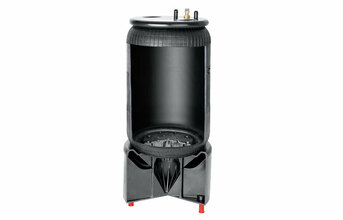
Innovations developed by Continental - e.g. lightweight technologies and efficient exhaust-gas aftertreatment solutions - can help to meet this challenge. Fewer emissions, lower consumption, falling operating costs, increasing payloads, and stricter emissions regulations or exhaust standards such as EURO 6 are therefore constantly driving the development of innovations.
Lightweight plastic replaces steel and aluminium
Modern commercial vehicles and buses are subject to exacting demands when it comes to efficiency. To improve the efficiency and cost-effectiveness of goods transportation, payload capacity is to be increased in compliance with statutory limits on axle loads. Reducing the weight is not just about reducing fuel consumption and, in turn, decreasing operating costs, but also brings other advantages, too: For example, with the weight-reducing air spring family from Continental, forwarding agents can gain 12-15 kg of payload capacity per axle. With a service life of 400,000 km, CO2 emissions drop by 200 kg as a result. In comparison with conventional steel pistons, this means as much as 75% less weight thanks to the use of a special plastic.
(Continued on next page)



























